

They come from all walks of life – from unemployed people to business executives. The stereotype that people lose their jobs due to substance use isn’t always accurate. If you use cocaine and have a job, though, the threat of losing it due to a random drug test is always there.
We don’t have to tell you how disruptive that fear is. You might know it firsthand, and wonder how long cocaine stays in your system.
Hope for Tomorrow is an addiction recovery center, and we take our role of empowering people to overcome their substance use seriously. We believe part of that role is equipping people with knowledge about substance use.
How long does cocaine stay in your system? We’ll answer that question and more in this blog.
When you administer cocaine, it’s absorbed into your bloodstream. That blood circulates, affecting every area of your body – eventually making it to your liver. Your liver is responsible for breaking down cocaine and other harmful substances in your body. The liver filters cocaine out of your blood and eliminates it through sweat and urine. Some of the harmless chemicals created from that process, known as cocaine metabolites, stick around even once the cocaine itself is filtered out of your system.

Most drug tests aren’t searching for cocaine itself – they’re looking for the cocaine metabolites produced when your liver breaks down cocaine. This means evidence of cocaine stays in your system well beyond when the effects of the substance wear off.
See the chart below for details on common cocaine drug tests and their average detection windows.
| Test | Description | Detection Time |
|---|---|---|
| Urine | Urine tests either test for cocaine directly, or a metabolite called benzoylecgonine. This is the most common drug test. | 24-48 hours |
| Blood | These are rare, because blood cycles out cocaine quickly, and the test is invasive. It’s only a decent indicator of if someone is currently under the influence of cocaine. | 5-12 hours |
| Hair | Hair doesn’t get rid of toxins – it just grows, so this option can detect cocaine use from a long time ago. It’s unreliable, because strands of hair are different, and evidence of cocaine use can disappear with a haircut. | 30+ days |
| Saliva | Saliva tests are growing in popularity because they’re easy to administer and harder to cheat. | 24-48 hours |
Cocaine’s effects don’t last long, and it ultimately doesn’t stay in your system for long either. In theory, cocaine’s half-life is one hour, which means it takes an hour for the liver to process half of the original dose of cocaine. In reality, cocaine’s half-life, and how quickly it leaves your system, depends on multiple factors, including:
While the method you use to administer cocaine does impact how you feel the effects of cocaine, it doesn’t impact how long the substance itself stays in your system. Your body will process cocaine at the same rate no matter what.
Combining cocaine with other substances causes it to stay in your system longer. All harmful substances must be processed by your liver, and it can only handle so much at one time. This can cause substances to build up in your body, and greatly increases the chance of overdose.
Remember, how long drug tests can detect cocaine in your system depends on the lingering chemicals your liver produces while breaking down cocaine, not the cocaine itself. The same factors that impact the half-life of cocaine also impact how long these chemicals stay in your body.
How long tests detect cocaine depends on the type of test, but sometimes even the manufacturer matters. They determine the amount of metabolites necessary to test positive for cocaine.
Despite what other articles might say, there are no scientifically proven ways to process cocaine faster than your body would naturally.

Cocaine can take over your life. Even if it hasn’t gotten that far yet, the fear that comes with hiding cocaine use can be overwhelming and alienating.
You deserve to live a peaceful life where you don’t have anything to hide. Achieving that requires you to turn away from cocaine use for good – and that’s a lot easier said than done.
Thankfully, you don’t have to do it alone. Treatment for cocaine addiction is available, and it can empower you to live a happy, healthy life.
Hope for Tomorrow is an addiction recovery center with locations in Point Pleasant, WV. We work to bring treatment for cocaine use disorder and other conditions to people from all walks of life. That includes veterans, pregnant women, people with physical health conditions, and anyone else who might feel left out at other treatment facilities. Hope for Tomorrow will welcome you with open arms, no matter who you are. Give us a call at 877-679-8162 to get started. We’d love to meet you!
Treatment today for a brighter tomorrow.